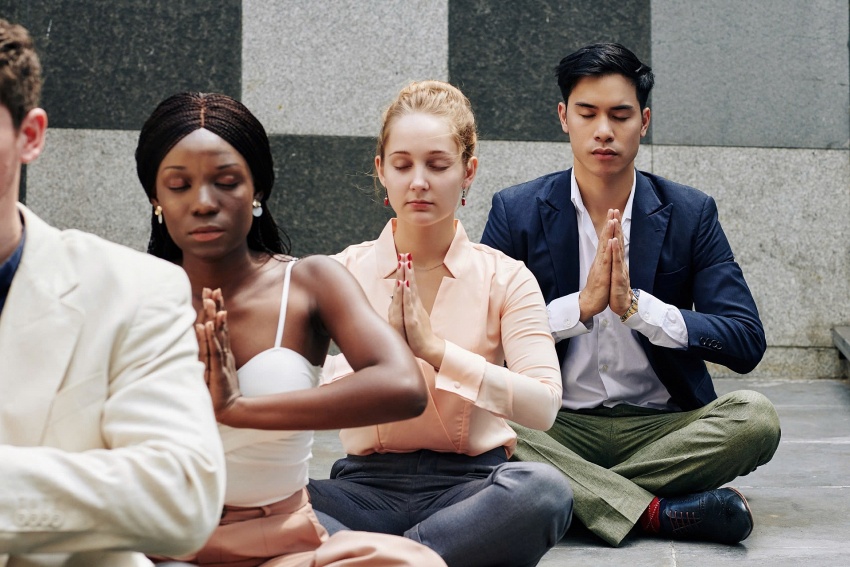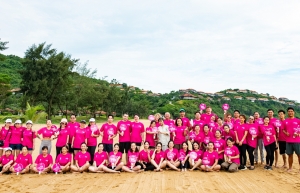Meditation remains key trend in business
The alarm clock blares. You groggily reach for your phone, already feeling the dread of unanswered emails, meetings to attend, and the overwhelming rush of another demanding day.
 |
| Photo: MotionArray |
But instead of jumping straight into the chaos, you pause. You take a deep breath, close your eyes, and sit in stillness for a few moments. In that space, something shifts – you feel calmer, more centred. Just like that, you’ve entered the world of meditation.
Last December, the United Nations recognised this simple act of calm on a global scale, passing a resolution to observe World Meditation Day every year on December 21.
This event, spearheaded by the World Meditation Foundation (WMF), marks a significant milestone in encouraging mindfulness and inner peace on a global scale. But why is meditation gaining so much attention today? To answer that question, it is best to explore the origins of meditation, its benefits, and how people use it in the modern world.
The history of meditation and how it works
Meditation is not just a trendy wellness hack – it’s been around for thousands of years. The earliest known records of meditation appear in the Vedas, ancient Indian scriptures dating back to around 1500 BCE.
As trade routes expanded, meditation gradually spread to the rest of the world. Modern scientific research and a growing understanding of meditation really is now helping it to be embraced worldwide.
"Meditation is for everyone," said George Sun, chairperson of the WMF. "Regardless of age, culture, or background, meditation helps individuals and their communities lead more peaceful and clear lives."
Today, meditation is more accessible than ever. Thanks to technology, apps, and online classes, people from all walks of life can easily incorporate meditation into their daily routines. Estimates suggest that between 200 and 500 million people practice meditation globally.
For many, meditation is appealing because of its powerful health benefits. Indeed, meditation does more than help us achieve a state of calm; it can actually make us healthier and more physically able.
"Research has consistently shown that meditation offers a wide range of benefits for mental and physical wellbeing," said Dr. Laurie Santos of Yale University. "Studies indicate that meditation can reduce stress, improve emotional regulation, and enhance cognitive function and attention."
Santos is a cognitive scientist and psychology professor at Yale. Her course, 'Psychology and the Good Life', is the most popular in Yale’s history, with approximately one quarter of Yale’s undergraduates enrolling in 2018.
"Meditation has been shown to increase happiness and overall wellbeing in several ways," she explained. "One key mechanism is through mindfulness, which helps individuals become more aware of their thoughts, emotions, and bodily sensations."
"Second, by observing experiences without judgment, individuals can decrease rumination and reduce negative emotional states, which are key predictors of unhappiness," she said. "Furthermore, some meditation practices like loving-kindness meditation, which fosters compassion, have been linked to greater feelings of social connection and kindness towards oneself and others, further promoting wellbeing."
Scientific research also indicates that meditation can influence how our brains work. Some studies have found that meditation can strengthen neural pathways, leading to improved focus, better emotional regulation, and even changes in brain structure linked to stress reduction.
With innovations like biofeedback devices and VR, meditation is becoming more immersive than ever. As meditation, science, and technology continue their collective advance, we are likely to see even more exciting developments soon, such as AI-driven meditation guidance and personalised neural feedback.
Meditation and business
Meditation is also taking the corporate world by storm, with forward-thinking businesses recognising the benefits of such an accessible practice after integrating it into their workplace cultures.
JPMorgan Chase announced plans to include meditation rooms in their new headquarters in New York city in 2022, while Google has been ahead of the curve with its 'Search Inside Yourself' course, designed to teach emotional intelligence through meditation, available since 2012
Meditation itself has also become a booming business model. The market for meditation apps alone is projected to exceed $5.72 billion this year and $7.4 billion by 2029, with top players like Headspace and Calm reaching over a hundred million users worldwide. The United States, China, and Turkey lead in revenue generation, while countries like Ireland, Chile, and Denmark boast the highest user penetration rates.
Additionally, many successful business leaders swear by meditation, crediting it for alleviating workplace stress and improving productivity.
For instance, Marc Benioff, CEO of Salesforce.com and co-owner of Time magazine, is a long-time meditator. He started meditating while at Oracle to help manage workplace stress, and later installed meditation rooms in Salesforce offices to support employee wellbeing.
Jeff Weiner, executive chairman of LinkedIn, is also a devout meditator. He meditates each morning before getting his children ready for school, pointing out that this practice made it easier for him to focus and navigate his day.
As more leaders embrace meditation, mindfulness may grow to play a large role in the future of business operations.
How to get started
If you’re feeling inspired to start meditating but aren’t sure where to begin, don't worry. Meditation may seem daunting – the prospect of completely clearing your mind – but it does not require hours of commitment or an in-depth understanding of ancient philosophies.
Santos encourages beginners to start small, "A great way to begin is by setting aside just five minutes a day for a simple practice, like focusing on your breath," she said.
"It’s natural for the mind to wander," she explained. "Meditation is more about developing awareness and acceptance of whatever thoughts or feelings arise, rather than forcing them away."
His Eminence Shyalpa Tenzin Rinpoche, founder of the Universal Peace Sanctuary, echoes this sentiment. "Meditation is not difficult," he said. "It is your second nature."
Having led sessions in Davos ahead of the World Economic Forum last January, Rinpoche is an advocate for meditation. He emphasises that meditation is more than just a tool – it is a way of being. "For me, the goal is to see and experience reality 24/7, without wasting a single moment," he explained.
When asked for a message he would like to share for future World Meditation Day, Rinpoche said, "Meditate 24/7. Life is not a rehearsal. Every moment is valid, so you must meditate to actualise reality in your being."
 | Live a day of wellness at Banyan Tree Lang Co Drawing on its core value of wellbeing, Banyan Tree Lang Co celebrated Global Wellness Day (GWD) 2023 on June 10 with a full-day event featuring various wellness activities, ranging from complimentary mindfulness walking, yoga, and meditation classes to a dance floor for everyone. All in-house guests and associates were invited to dive deeper into their wellbeing journey. |
What the stars mean:
★ Poor ★ ★ Promising ★★★ Good ★★★★ Very good ★★★★★ Exceptional
Latest News
More News
- Dong Ho folk painting added to UNESCO’s urgent safeguarding list (December 11, 2025 | 18:09)
- Conference focuses on switch from dog and cat meat trade to sustainable, safe jobs (December 11, 2025 | 12:13)
- 3F Plus clean pork amazes Michelin-starred chefs (December 09, 2025 | 12:15)
- The Rhythm of Blues – Colours of the Year 2026 (December 06, 2025 | 12:10)
- Pan Pacific Hanoi kicks off 2026 art awards celebrating young and disabled artists (November 06, 2025 | 18:25)
- PREP AI Language Fair 2025 highlights AI-powered language learning (November 03, 2025 | 09:00)
- Hanoi strengthens rabies control and supports transition of dog and cat meat trade (October 28, 2025 | 18:09)
- World-famous Gaia Earth installation touches down at UNIS Hanoi (October 07, 2025 | 13:40)
- Sidecar passion drives Vietnamese motor enthusiasts wild (September 05, 2025 | 09:00)
- Sheraton Saigon unveils artistic mooncake collection for 2025 (August 08, 2025 | 09:00)


















 Mobile Version
Mobile Version